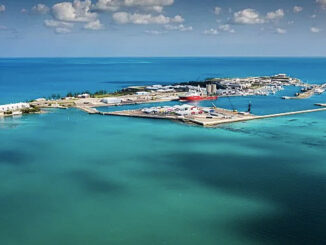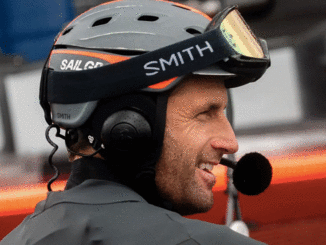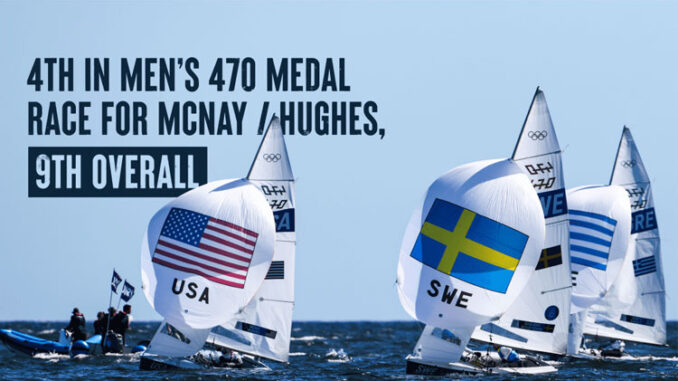
Cover photo: Stu McNay (Providence, RI) and Dave Hughes (Miami, Fla.) August 4, 2021, photo © Sailing Energy / World Sailing
Enoshima, Japan – August 4, 2021 – By U.S. Sailing – Team USA’s Stu McNay (Providence, R.I.) and Dave Hughes (Miami, Fla.) competed in the Men’s 470 medal race on Wednesday, the final day of sailing events at the Tokyo 2020 Olympic Games. McNay and Hughes finished 4th in the double-points medal race, which lifted them to 9th overall.
“Prior to the start, we did our homework with the current readings, but we felt like it would be evolving and we wouldn’t really know how it would affect the course until we got onto it,” said McNay, who has qualified for two consecutive Olympic medal races with Hughes as his teammate. “With a minute to the start, the fleet was very dense at the committee boat, so we felt that our best opportunity was to be leeward of that pack and to follow them to windward. But by that time, everyone had tacked on port.”
In a typically tight 470 medal race, the Americans occupied every position from 1st to 6th at different stages of the race, but finished 4th in the end and 9th overall. In the 10-race qualifying series prior to the medal race, McNay and Hughes notched seven single-digit scores and discarded a 12th.
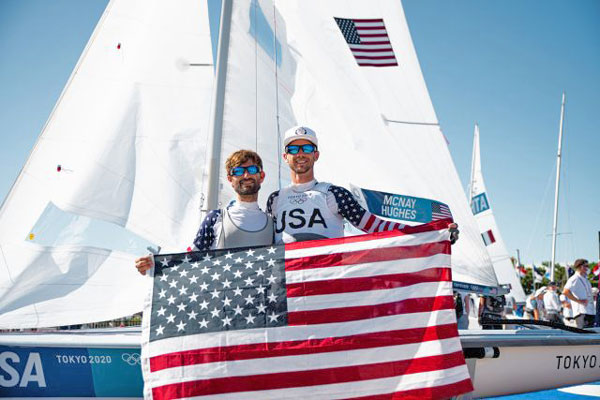
“The battle at the Olympics is trying to figure out what the priorities are and moving forward with every leg, every race, and every day,” said Hughes. “What sticks out to me from this regatta is just the two of us trying to be better teammates to each other through thick and thin, and through good races and bad races. And that was a real pleasure. At the end of the day, the best asset in the boat is the guy sitting next to you and across from the traveler bar.”
McNay and Hughes entered Tokyo 2020 as medal contenders in the 470 after finishing 4th at Rio 2016, and after a strong 5th place finish at the 2021 470 Worlds in Vilamoura, Portugal. McNay, a four-time Olympian with two different teammates, noted that the challenge of performance development over the course of an Olympic cycle was not just to match your competitors in terms of technique, equipment and execution, but to find new ways to improve.
“To be successful in the 470 class, you really have to chart your own course and develop your own performance,” said McNay. “You have to develop your future performance in relation to your past and look at your own strength and weakness rather than trying to copy another model.”
Hughes said that their finish in Rio spurred them to work even harder to improve the result in Tokyo, and that both the level and depth of the fleet was considerable. “Just like most of these teams, coming out of Rio, we wanted to stand on the podium at this event and we constructed our quadrennium to make that happen,” said Hughes, who along with McNay was coached by two-time Olympian Thomas Barrows (Cambridge, Mass.).
“This quad was obviously quite a bit different and turned out to be a five year situation for all parties,” continued Hughes. “Looking back on it, we essentially were just trying to become better sailors and let the regatta shake out as it may. We definitely accomplished that. So Stu and I are buoyed by that, and it was fantastic to close out our time together over these many years and close out the men’s 470 as an Olympic discipline in a fantastic medal race that the world was able to see.”
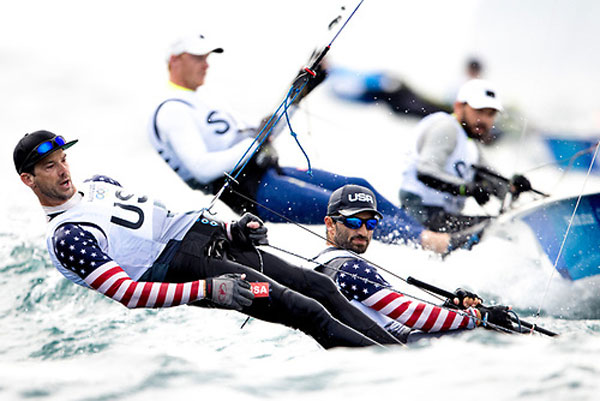
For the veteran American double-handed dinghy team, and for the 470 class as a whole, it was the end of an era. After Tokyo 2020, the 470 will remain in the Games but transition to a mixed-gender class, like the Nacra 17. As an open or split class, the 470 has been featured at the Olympics for 45 years.
Unable to continue campaigning for the Olympics with each other, the rule change will bring to an end one of the US Sailing Team’s most successful partnerships of the past decade. In addition to their near-miss of an Olympic medal in 2016, they reached the podium at major events over two dozen times during the past nine years. At the 470 World Championships, they finished top-10 in 2013, 2014, 2017, 2018 and 2021, and were contenders at each event they entered.
“Sailing at this level is a personal challenge. It is an opportunity to look at yourself in the mirror, to see what you have and where you can go,” said McNay. “We feel honored that we get to be the standard bearers for the United States in this class at this Olympic Games.”
Completed Racing for Team USA:
- Women’s 49erFX – Stephanie Roble (East Troy, Wis.) Maggie Shea (Wilmette, Ill.) – 11th Overall
- Women’s Laser Radial – Paige Railey (Clearwater, Fla.) – 37th Overall
- Men’s Laser – Charlie Buckingham (Newport Beach, Calif.) – 13th Overall
- Women’s RS:X – Farrah Hall (Annapolis, Md.) – 15th Overall
- Men’s RS:X – Pedro Pascual (Miami, Fla.) – 9th Overall
- Men’s Finn – Luke Muller (Ft. Pierce, Fla.) – 13th Overall
- Women’s 470 – Nikole Barnes (St. Thomas, U.S.V.I.) and Lara Dallman-Weiss (Shoreview, Minn.) – 12th Overall
- Mixed Nacra 17 – Riley Gibbs (Long Beach, Calif.) and Anna Weis (Fort Lauderdale, Fla.) – 9th Overall
- Men’s 470 – Stu McNay (Providence, RI) and Dave Hughes (Miami, Fla.) – 9th Overall
NBC Olympics Sailing Broadcast:
The NBC Olympics website is hosting the Tokyo 2020 sailing event for U.S. audiences starting at 11:00 PM EDT (8:00 PM PDT) during the event. There are two televised race areas per day, the “Enoshima” and “Kamakura” courses. As the classes rotate through each course daily, different athletes will be featured on the broadcast.
